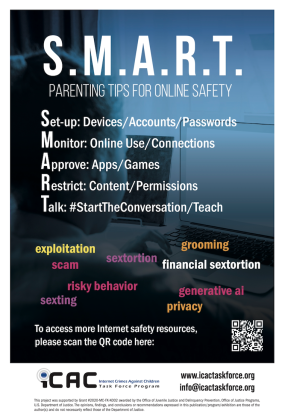“Hug your kids a little tighter tonight” appeared on social media posts again recently in the wake of devastating stories of child sexual abuse, pornography and death in and around Osceola County. Parents instinctively scramble to shelter their children when cases such as these surface, while knowing deep down that they can’t protect them from every potential harm. It can be an overwhelming feeling, but there are some programs that can help parents—and their kids— be cautious and have some power in a world that can feel out of control.
The Florida Department of Law Enforcement website (https://offender.fdle.state.fl.us/offender/sops/neighborhoodSearch.jsf) is a good place to start. This neighborhood search shows Florida sexual offenders or predators who have registered an address within a specified radius. Enter an address and choose a radius, and a map and list will be generated that will show registered offenders/ predators in your area.
While the neighborhood search is a starting point, it is wise to teach children to determine the safety of situations and what to do if they feel unsafe. The National Center for Missing and Exploited Kids has re-thought the previous “Stranger Danger” method of warning children. “The concept of ‘stranger’ may be difficult for kids,” the website states.
“Many believe that strangers are mean, ugly people—so the nice man asking for help to find his lost puppy? Not a stranger … Children also should learn that some strangers– like store clerks, police officers, or parents with children–can be helpful when they are in need.
“It may be hard for kids to understand the difference between strangers who could hurt them and strangers who may help them. Most importantly, ‘stranger danger’ ignores the fact that most children are abducted by someone they know. Avoiding strangers will not help if the abductor is a family member, neighbor, or family acquaintance. When you talk to your children about abduction prevention, don’t focus on warning them about certain types of people. Instead, teach them to identify and respond to threatening situations.”
The National Center for Missing and Exploited Kids website, (https://www.missingkids.org/education/kidsmartz#resources) has many resources to help parents prepare their children to recognize and act in unsafe situations.
And while it’s important to teach children to be safe in the community, is just as important to teach them to be safe where they spend so much on their time: online. With the world literally at their fingertips, youth today are susceptible to many kinds of exploitation. The Internet Crimes Against Children Task Force Program offers parenting tips and resources for online safety at: https://www.icactaskforce.org/internetsafety.
“The best tool we have to prevent Internet crimes against children is education and continued conversation,” the website states.
That’s a sentiment shared Osceola County social worker and therapist Jearene Webb.
“I would encourage parents to provide a safe and private space for the child to feel they can talk to them without a negative overreaction, shaming or rejection on the parent’s part,” Webb said. “Whether it be out on a ‘date,’ at bedtime when they’re winding down, or communication through a journal they leave with a parent somewhere the parent can access it— however that child feels the most comfortable communicating.
“Some kids don’t like face-to-face, or eye contact may make them uncomfortable, so even communication through text message could be used. Parents need to look for signs that their child may be acting differently. The child may get quieter, the grades usually start going lower, they may start exhibiting some signs of anxiety: lip biting, trouble sleeping, bed wetting over the age of 5, heightened emotions, seems more distracted, etc. If parents see any of these signs and they try talking to their child and their child isn’t opening up, finding a counselor/mental health therapist would be a great idea.”



